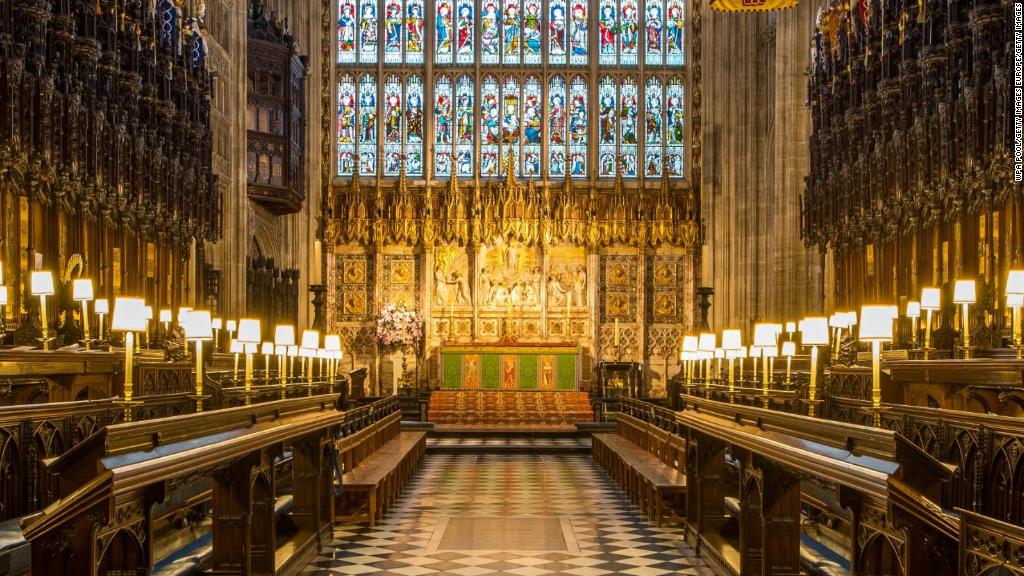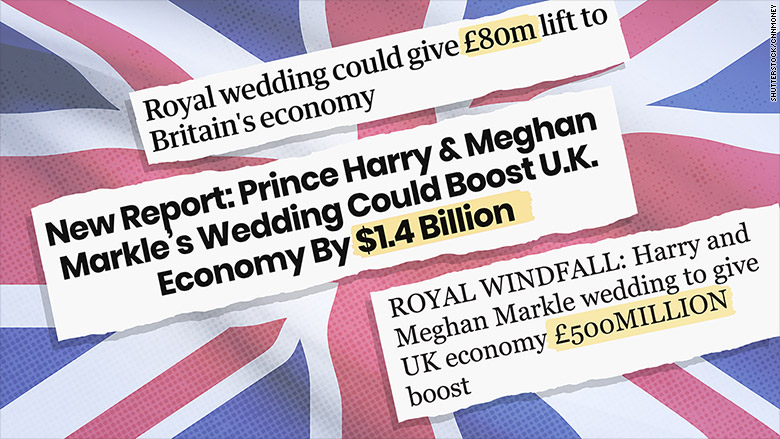
It's a favorite tabloid newspaper headline: The Royal Wedding will bring a HUGE boost to the economy.
Parts of the British press have been confidently suggesting Prince Harry and Meghan Markle's nuptials on Saturday will benefit the country's economy to the tune of hundreds of millions of pounds.
Retail spending is likely to get a lift from fans and well-wishers buying Royal Wedding souvenirs and food and drink for parties.
But past experience shows that grand royal events don't usually produce the big bucks businesses would like, and they barely register in terms of the performance of the wider economy.
"We would be wary of over-egging the potential impact or seeking to put a hard figure on the potential gains," said Howard Archer, chief economic adviser to the EY ITEM Club.
"It should be kept in mind that some of the retail spending may just be switched from spending on other items."
If history repeats itself, the Royal Wedding will fall flat in terms of economics.
According to the UK Office for National Statistics, the 2011 wedding of Prince William and Kate Middleton did not result in a noticeable uptick for the economy.
Most workers were given an extra day off when William, Harry's elder brother and second in line to the throne, got married in April 2011, denting activity across the economy that month.
Setting aside the hit from the extra day off, there was no noticeable lift for the economy.
PwC estimated William and Kate's wedding generated roughly £107 million ($145 million) in extra spending: Good for retailers, but less than 4% of the amount spent in the UK on Black Friday, the busiest shopping day of the year.
Hangover to come?
And any splurge in spending this month may be followed by a slump in June. ONS data shows that while retail sales spiked in April 2011, they fell the following month.
Pubs are likely to be busier thanks to extended opening hours. The UK parliament is allowing all pubs to remain open through 1 a.m. on Friday and Saturday, as opposed to the usual 11 p.m., because of the wedding.
But how much of the extra drinking is down to the wedding will be hard to judge, particularly as one of the UK's biggest annual sporting events -- the FA Cup soccer final -- falls on the same day.
The British Beer & Pub Association expects sales will be £20 million, or about 8%, higher than a normal weekend.
However, the boost could be offset by those who choose to stay home and watch the event on television, instead of going out and spending money on other activities.

Related: How does the royal family make its money?
No tourism bump
There was also no significant boom in tourist arrivals or spending on and around the last royal wedding. The number of people arriving in the UK in April 2011 was little changed, and roughly 500,000 Brits took advantage of the extra day off to leave the country.
A similar pattern is expected this time. There hasn't been a noticeable rise in the number of flight bookings to the UK for the wedding, according to travel experts.
Analysts expect that any spike in visits from royal fans will be counteracted by the desire of other tourists to stay far away from the crowds.
Royal wedding: Tourists won't flock to UK for Harry and Meghan
'Feel good' factor will fade
The UK economy could do with a boost. British GDP grew by just 0.1% in the first quarter of 2018 compared to the previous three months, representing the weakest expansion in more than five years.
With key policy questions unanswered and time ticking down, economists said uncertainty over Britain's exit from the European Union in March 2019 and pressure on wages had harmed growth.
A "feel good" factor generated by Meghan and Harry's wedding could prompt people to spend more. But that is unlikely to last long.
"This will likely be short lived as it does not affect the economic fundamentals facing households," said Archer.


